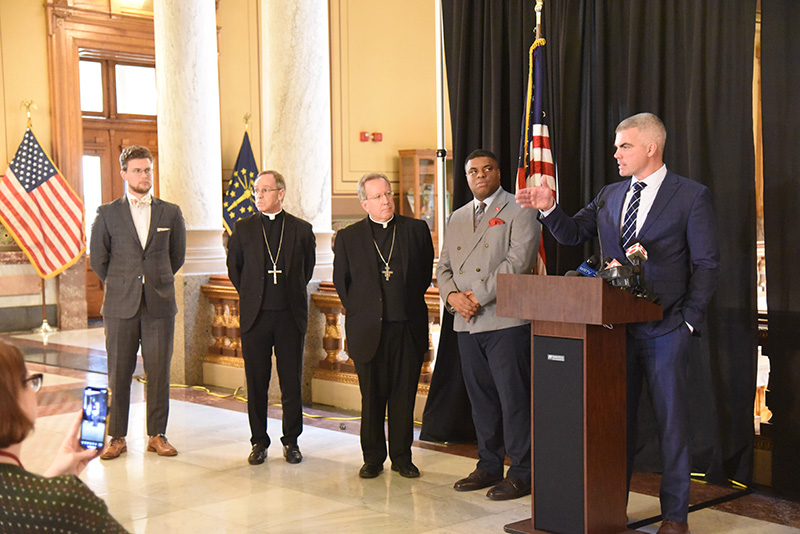
By Victoria Arthur, Statehouse Correspondent for Indiana’s Catholic Newspapers
Following the first execution that Indiana has carried out in 15 years, Catholic lawmakers and leaders are taking center stage in seeking a permanent end to the death penalty in the Hoosier state.
Bishops, a bipartisan group of state legislators and other advocates joined Rep. Bob Morris (R-Fort Wayne) at a Feb. 3 press conference at the Indiana Statehouse to support House Bill 1030, a measure introduced by the Catholic lawmaker that would eradicate capital punishment in Indiana.
Archbishop Charles C. Thompson of Indianapolis addressed reporters gathered for the press briefing organized by the Indiana Catholic Conference (ICC), the public policy voice of the Catholic Church in Indiana.
“The Catholic Church has consistently sought to protect human life from the moment of conception to natural death,” Archbishop Thompson said. “The bishops of Indiana have joined in this call for several decades, as have leaders of other religions in this state. St. John Paul II reminded us in 1999 that the new evangelization calls us to be unconditionally pro-life, and that modern society has the means to protect itself without denying criminals the chance to reform.”
The archbishop told those gathered that, more recently, Pope Francis underscored the Church’s opposition to capital punishment. In a 2018 revision to the “Catechism of the Catholic Church,” Pope Francis declared the death penalty “inadmissible because it is an attack on the inviolability and dignity of the person.”
“Our witness to respect for life shines most brightly when we demand respect for each other and every human life, including the lives of those who fail to show that respect for others,” Archbishop Thompson further quoted from the United States Conference of Catholic Bishops. “The antidote to violence is love — not more violence.”
Debate over the death penalty in Indiana was recently reignited in the wake of the recent execution of 49-year-old Joseph Corcoran for the murders of four people in 1997. Corcoran died by lethal injection at the Indiana State Prison in Michigan City before dawn on Dec. 18.
Following Corcoran’s execution, there are now seven other men on death row in the northwest Indiana prison.
“This was the first time in my 15 years since being elected that a person was executed in our state,” Rep. Morris told those gathered at the press conference, where he was joined by many colleagues from both the Indiana House and Senate. “As I look at the seven other inmates currently sitting in our state prison set for execution, one of the great concerns I have is for the employees of our Department of Corrections who are charged with the duty to execute a prisoner — the same prisoner they spend many hours with, making sure they’re fed and housed in appropriate conditions.”
Bishop Robert J. McClory of the Diocese of Gary, in which Michigan City is located, was among those praying outside the prison the morning of the Dec. 18 execution. On Feb. 3, he traveled to Indianapolis for the press briefing, explaining to reporters that he stood in solidarity not only with those on death row but also with murder victims and the grieving family members they leave behind.
“To be supportive of the abolition of the death penalty is not to discount the pain and the suffering of victims of heinous crimes,” Bishop McClory said, citing a 2019 letter issued by the bishops of Indiana and the ICC. “In seeking to end the use of the death penalty, we do not dismiss the evil and the harm caused by people who commit horrible crimes, especially murder. We share in the sorrow and the loss of family and victims of such crimes, and we call upon our faith community and all persons of good will to stand with the victims and to provide spiritual, pastoral and personal support.”
Bishop McClory said that the capital punishment system has been flawed in numerous cases and offers only “the illusion of closure and vindication.”
“No act – even an execution – can bring back a loved one or heal terrible wounds,” the bishop said. “The pain and the loss of one death cannot be wiped away by another death.”
Indiana is one of 27 states that allow capital punishment. House Bill 1030, which at press time was still awaiting a committee hearing, would bring an end to the practice in the state.
Alexander Mingus, ICC executive director, expressed his appreciation to Demetrius Minor, a pastor from Tampa, Florida, for his help orchestrating the Feb. 3 press conference.
“This conversation about capital punishment has ignited a renewal of commitment to a consistent vision of the dignity of the human person from conception to natural death,” Mingus said. “As Catholics, we must profess and uphold a consistent ethic of life and stand up against all attacks on life. We are hopeful that our continued efforts will change hearts and minds on this important issue.”
To follow priority legislation of the ICC, visit www.indianacc.org.
